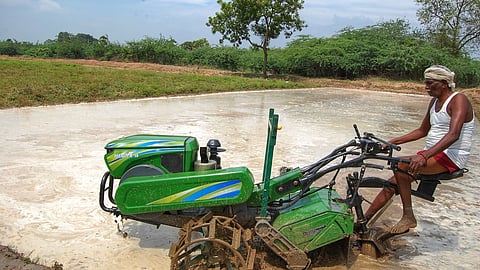

VIZAG: Organic agriculture is a fast-growing system for sustainable farming. But experts have long debated its lower yield as compared to conventional farming, arguing it requires more area to generate the same amount of food as conventional farms, further exacerbating deforestation and biodiversity loss.
A new study found that the yield of organic farming was on an average 18.4% lower than that of conventional farming, regardless of climate conditions, crop type and other categorical variables. But in warm temperate climates, the yield gap dropped to 21.18% as against conventional farming.
The study titled “Yield Gap between Organic and Conventional Farming Systems across Climate Types and Sub-Types: A Meta-Analysis,” analysed data from 105 studies and 786 observations. It focused on the role of temperature and precipitation in soil microbial activity, a key factor in organic farming. The researchers found that specific crop types, regions and soils significantly influence the yield gap.
They emphasised the need to consider interactions between variables when assessing the productivity of organic and conventional farming.Conventional agriculture widely uses synthetic pesticides, herbicides and fertilisers wth fields often having short crop rotation cycles.
In contrast, organic farming is a holistic production system that eliminates the use of synthetic inputs to promote health, biodiversity, biological cycles and soil biological activity. According to the 2022 report of the Research Institute of Organic Agriculture, 74.9 million hectares of land were used for organic farming as of 2020, including areas in conversion.
That is equivalent to 1.6% of the global total agricultural land.Using R software for meta-analysis, the study classified climates into boreal, warm temperate, arid, and equatorial, based on the Köppen-Geiger climate classification. “Among the categorical variables evaluated, it was found that specific crop types, regions, and soils significantly influenced the yield gap. Additional analyses revealed a confounding crop-type effect on the yield gap that requires further investigation.
Nevertheless, the study suggests that when determining variations in the yields and productivity of organic and conventional farming systems, it is critical to account for interactions between variables,” the researchers noted. Contrary to initial expectations, researchers found that while climate types had a significant effect on the yield gap, estimating variability associated with temperature and precipitation proved challenging with the available data.
This highlights the need for more targeted research to understand the nuanced interactions between climate conditions and farming productivity. The environmental benefits of organic farming, such as higher soil organic matter concentration and increased biodiversity, have been widely acknowledged.
However, concerns about lower yields have been a point of contention. This study offers a nuanced perspective, emphasising the importance of considering climatic conditions and other influencing factors when evaluating the overall sustainability and productivity of organic farming. While acknowledging the limitations in quantifying the influence of temperature and precipitation, the researchers called for further investigations to provide a more comprehensive understanding.
The study serves as a vital step towards informing land use development for sustainable agriculture, offering valuable insights for policymakers, farmers and researchers alike. “The type of climate affects the yield ratio between organic and conventional farming.
However, its variability in climatic conditions, specifically the relative change in temperature and precipitation, is challenging to estimate using the currently available data.” As the global agricultural landscape faces challenges in feeding a growing population sustainably, this research contributes to the ongoing discussion about the role of organic farming in achieving ecological balance and food security.